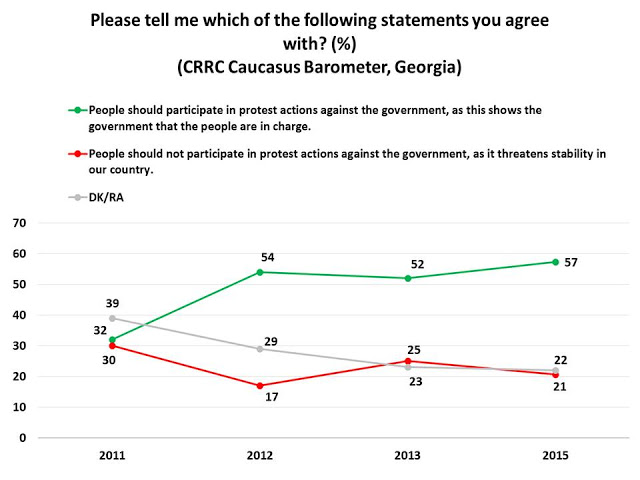Following the first ever peaceful transition of power in Georgia’s 2012 parliamentary elections, the country improved its position in the Freedom House and Polity IVdemocracy rankings. Results from the latest polls, however, show that public support for democracy in Georgia has declined over the past few years. Weakening support for democracy can pose a serious problem for the process of democratic consolidation in Georgia, that is, the institutionalization and maturation of Georgia’s democracy. Reversion to a non-democratic system is unlikely in consolidated democracies, where a democratic system is accepted as “the only game in town”. Public opinion polls make it possible to measure public’s support for democracy. This blog post looks at how attitudes towards democracy have changed in Georgia in recent years.
According to CRRC’s 2015 Caucasus Barometer (CB) survey, nearly half of the population of Georgia (47%) agrees that “democracy is preferable to any other kind of government”, and only 16% thinks that “in some circumstances, a non-democratic government can be preferable”. However, if we compare these findings with previous waves of CB, it is clear that during the past four years, support for democracy has declined in Georgia. It was rather stable from 2011 through 2013, with approximately two thirds of the population reporting that democracy is the best form of governance. While in 2011, only 8% thought that “in some circumstances, a non-democratic government can be preferable”, this share doubled in 2015. The share of those who answered ”for someone like me, it doesn’t matter what kind of government we have”, also increased during the same period.
Notably, the share of the population who consider Georgia a democracy has declined. According to CB 2011, half the population characterized Georgia as either ”a full democracy” (8%) or ”a democracy but with minor problems” (42%). In 2015, only 3% and 20% reported the same. The share of those who characterized Georgia as ”a democracy but with major problems” or ”not a democracy” increased.
It might be expected that one of the reasons why support for democracy declined would be the weakening of democratic values. Although a number of indicators can be used to test this, CRRC data do not suggest that this is the case. Support for democratic values has, in fact, visibly increased. For instance, the share of the population who agrees with the statement that “people should participate in protest actions against the government, as this shows the government that the people are in charge” has increased. Since 2012 the share of the public agreeing with this statement has been at least twice as large as the share of those who agreed with the opposite statement.
Although, over time, the share of the population who regard Georgia as a democracy declined, the data shows that freedom of speech has likely been strengthened. For instance, since 2009 the share of those who agree that in Georgia people have the right to openly say what they think increased from 55% to 72% in 2015, while the share of those disagree with the opinion halved.
There is, thus, no empirical evidence confirming that the decline in public support for democracy in Georgia is caused by the weakening of democratic values. Hence, the reasons for the decline described in this blog post likely lay elsewhere.
When Georgia’s democratic development is discussed, public opinion is often forgotten. As this blog post has tried to demonstrate, the political elite should not take public support for democracy for granted. Attitudes towards democracy, like other attitudes, may often be changing. Further research is needed to understand the causes of this, since democratic consolidation is less likely without public support.
To find out more about public attitudes in Georgia, visit CRRC’s online data analysis tool.
















